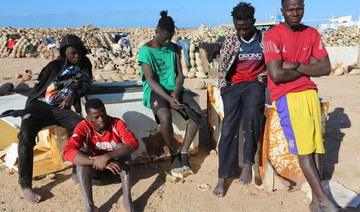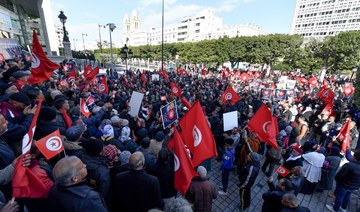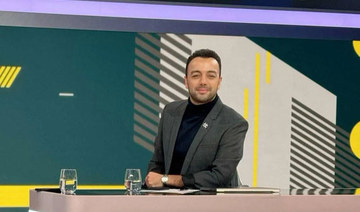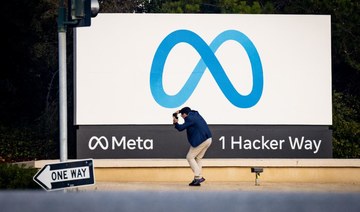TUNIS: Tunisia’s education minister has lashed out at a Ramadan TV series accused of tarnishing the reputation of schools, while two lawyers launched a bid to take it off the air.
The controversy came after private channel El Hiwar Ettounsi on Thursday evening broadcast the first episode of the soap opera “Fallujah.”
Named after a city that became a symbol of Arab resistance for battling American occupation forces after the 2003 invasion of Iraq, the series is a drama about a group of high school students, their behavior toward their teachers and their often difficult home lives.
In one scene, a new teacher is hit on by students in the classroom then finds her car tagged with “Welcome to Fallujah.”
In another, a drug dealer in the schoolyard hands out ecstasy tablets to students who then sell them on to classmates.
Education Minister Mohamed Ali Boughdiri told local radio he had alerted Prime Minister Nalja Bouden.
“We will take all necessary measures to take this farce off the air. It has offended families, undermines the entire education system and considerably harms the image of Tunisian schools,” he said.
Two lawyers also filed a request to a Tunis court to stop the broadcasts immediately.
“This series deliberately undermines (public) morals and the educational system by disseminating obscenities,” lawyers Saber Ben Ammar and Hssan Ezzedine Diab wrote.
Teacher’s union the Federation of Secondary Education said the series “seriously harms teachers” and urged the ministry of education to investigate how a private TV channel was able to film in it a public school.
Union chief Lassaad Yaacoubi said the ministry had approved the filming in exchange for giving the school some of the furniture used during the production.
Gritty school drama sparks controversy in Tunisia
https://arab.news/zhfn4
Gritty school drama sparks controversy in Tunisia
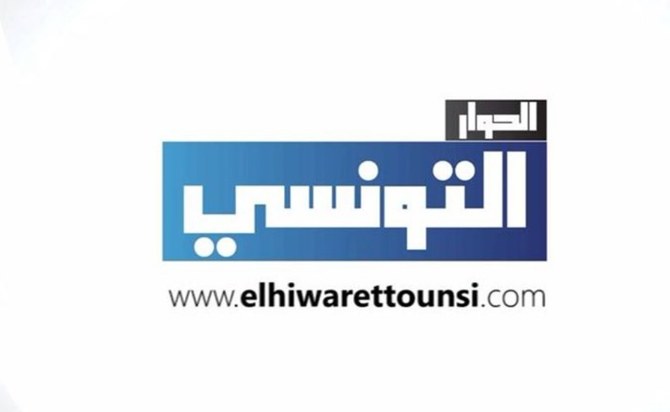
- The controversy came after private channel El Hiwar Ettounsi on Thursday evening broadcast the first episode of the soap opera "Fallujah"
- Education Minister Mohamed Ali Boughdiri told local radio he had alerted Prime Minister Nalja Bouden
TikTok launches awards scheme for best ad campaigns on the platform in Middle East

- The awards cover six categories designed to recognize different aspects of campaigns
- The winners will be announced during a ceremony in November
DUBAI: Short-form video app TikTok has launched an inaugural awards program to recognize and honor the best advertising campaigns on the platform in the Middle East, Turkey, South Africa and Pakistan, based on their creativity and performance.
“We have seen how creative talents from different backgrounds leverage digital platforms such as TikTok to push creative boundaries and set new benchmarks for advertising,” said Shadi Kandil, the company’s general manager of global business solutions in the Middle East, Turkey, Africa, Central and South Asia.
“This is exactly why it is important to celebrate the role brands and agencies play in promoting this dynamism. Through the TikTok Ad Awards, we aim to not only recognize their innovative efforts but also amplify the unique cultural narratives of communities within this region.”
Similar TikTok awards programs are already established in other markets but this year marks the first time they have been open to advertisers in the four listed territories. They cover six categories designed to recognize different aspects of ad campaigns.
“It’s the Creative for Me” celebrates campaigns with strong ideas and strategies specifically designed for the platform, while “Bougie on a Budget” honors those crafted on modest budgets that combine paid and organic content.
“The Trendsetter” category aims to recognize brands and agencies that harness the platform’s advertising products in innovative and effective ways.
Music and audio effects, and the influencers who operate in related spaces, are pivotal for TikTok. With that in mind, the “Sound On Please!” category will reward campaigns in which sound is a key element.
“Community Core” is for advertisers that leverage the talent of TikTok creators, while the audience at the awards ceremony in November will vote on the finalists in all the categories to choose a “People’s Choice” winner.
The TikTok Ad Awards are now open to submissions from brands and agencies in Saudi Arabia, the UAE, Qatar, Egypt, Turkey, South Africa and Pakistan. The deadline is Sept. 6.
BBC urges UN experts to condemn Iran’s ‘harassment’ of its journalists
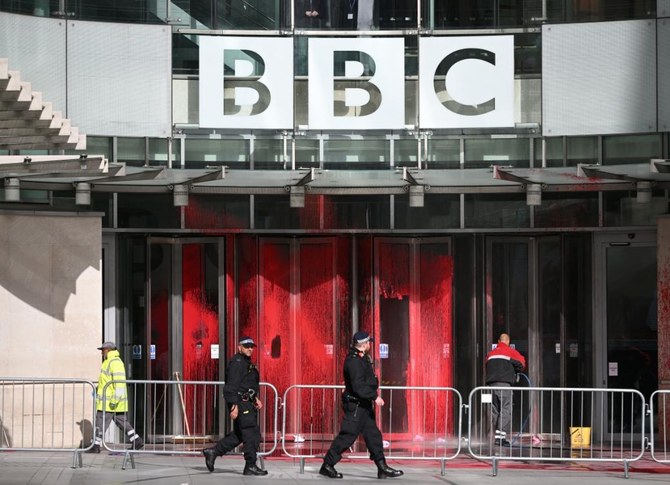
- Tehran has convicted some of the broadcater’s Persian journalist of “propaganda” against the state
LONDON: The BBC on Tuesday urged United Nations experts to condemn the “ongoing targeting and harassment” of some of its Persian language journalists after Tehran convicted some for “propaganda” against the state.
According to the broadcaster, documents published in February by a hacking group appear to reveal that a number of current and former BBC News Persian journalists were convicted in absentia by an Iranian court in February 2022 for “propaganda against the Islamic Republic.”
A complaint was submitted by lawyers on behalf of the BBC to five special rapporteurs, it said in a statement.
The rapporteurs are independent experts in areas such freedom of expression and human rights and summary or arbitrary executions, who do not speak for the UN but report their findings to it.
“Recent developments have amplified the severe situation facing our BBC News Persian staff on a daily basis. They are being penalized for their journalism and professionalism,” said BBC World Service director Liliane Landor.
“We are urging UN experts to robustly condemn the Iranian authorities’ harassment and to hold the regime to account,” she added.
Lawyers Caoilfhionn Gallagher and Jennifer Robinson, who are acting for the BBC, accused Iran of abusing “national security and counter-terrorism laws against the BBC.”
They said “convictions in absentia for BBC News Persian journalists for ‘propaganda’ against the state for their independent reporting on Iran are designed to intimidate and silence the BBC’s journalism about Iran.”
“We call on the UN to denounce these unlawful actions in the strongest possible terms,” the pair added.
The BBC said the “targeting and intimidation” of staff had “escalated dramatically” since September 2022 following mass protests in Iran.
The appeal follows an earlier joint statement by four UN experts in 2020 in which they voiced their “alarm” at the treatment of BBC journalists and their families.
Last month, Pouria Zeraati, a UK-based presenter for Persian-language Iran International, sustained injuries to his leg after being stabbed by two assailants outside his London home.
Counter terrorism detectives are probing the assault and say his attackers went straight to Heathrow airport and left the country within hours.
A 2024 survey of BBC News Persian staff found half of the respondents said they had received online threats or been harassed online for working for the BBC.
Stabbed Iranian journalist Pouria Zeraati said ‘feeling much better but recovery takes time’

- Iran International presenter talked to BBC Radio 4 on Tuesday about the attack outside his home
LONDON: Stabbed Iranian journalist Pouria Zeraati said Tuesday he was “feeling much better” but he is still far from fully recovering.
The Iran International presenter spoke to BBC Radio 4’s “Today” program about the attack and the toll it has taken on his life.
“I’m feeling much better physically, but as you know, mental recovery takes time,” Zeraati said, adding that “the show must go on”.
The journalist was attacked late last month outside his home in south London. He was stabbed by three men and hospitalized with injuries to his leg.
Recalling the moment of the assault, Zeraati told BBC Radio 4 that he was going to his car to head to the studio when a “suspicious” looking man approached him and asked for some change.
“He pretended to be asking for change, as I was saying, ‘excuse me I don’t have any change,’ and I was going to unlock the door, the second man approached,” he said.
“They grabbed me from the front, very strong, I couldn’t move my hands” before one of the attackers stabbed him in the leg.
The pair immediately fled in a car that was waiting to drive them to Heathrow Airport.
“I just noticed all my belongings are with me, including my mobile phones, my watch, my AirPods, my wallet with cash in it, so the moment I just saw everything is with me, I noticed this is regarding my job, because it wasn’t a robbery,” he told “Today.”
He was taken to the hospital shortly after and later discharged. He is currently staying in a safe place under police supervision.
The Metropolitan Police said the suspects had left the UK but are still investigating the reason behind the attack.
Staff of Iran International have previously been targeted by threats linked to the Iranian regime, and the dissident broadcast had been listed as a terrorist organization in Iran for its coverage of Iran’s 2022 uprising.
Iran’s charge d’affaires in the UK, which serves as the head of its diplomatic mission, has denied any link between the Iranian regime and the attack on Zeraati.
The journalist returned to work earlier this month as a way to “send the message back”.
“I’m here, the show is going on, and my audience is still watching this show,” Zeraati said.
Meta ‘temporarily’ closes Threads network in Turkiye

- Decision was taken to comply with injunction prohibiting data sharing with Instagram
- Ruling do not imlact Meta’s other services like Facebook, Instagram and WhatsApp
ISTANBUL: Facebook owner Meta said Monday it would “temporarily” shut down its Threads short-messaging service in Turkiye after an order from Ankara’s competition watchdog over data-sharing.
The interim ruling from the Turkish Competition Authority (TCA) has “no impact” for Meta’s other services like Facebook, Instagram and WhatsApp in Turkiye, the company said in a statement posted to its website.
“We disagree with the interim order, we believe we are in compliance with all Turkish legal requirements, and we will appeal,” Meta said — although it had “no choice but to temporarily shut down Threads” in Turkiye.
Meta launched Threads last year as a competitor to X (formerly Twitter), with boss Mark Zuckerberg saying in February the service had 130 million monthly users worldwide.
It was available in Turkiye from the start, while European Union users had to wait months for Meta to come up with a version adapted to strict data protection and competition laws.
In its March finding, the TCA had said Meta’s combination of user data from Instagram with people’s Threads profiles “will lead to irreparable harms.”
Given its vast user base, data collection and financial resources, “Meta’s practices in the market constitute a barrier to entry” for prospective competitors, the authority added.
Meta said it would allow existing Threads users to delete or deactivate their profiles ahead of the April 29 cut-off, with a chance of reactivating them should the ruling be overturned.
British TV presenter under fire for ‘Islamophobic’ tweet in aftermath of Sydney mall attack

- Critics say Rachel Riley should be sacked after she draws parallel between calls for Palestinian intifada and unrelated attack in Australia that left 6 people dead
- The ‘Countdown’ star later clarifies her comments and says she apologizes if her message was ‘misunderstood’
LONDON: British TV presenter Rachel Riley has responded to criticisms she received after posting a message on social media platform X in which she appeared to link a stabbing rampage at a Sydney shopping mall on Saturday, which left six people dead, with ongoing protests calling for a Palestinian “intifada,” or uprising.
The celebrity, best known for appearing on the Channel 4 game shows “Countdown” and “8 out of 10 Cats Does Countdown” said she apologized if her words had been “misunderstood.”
In a message posted soon after the attacks, Riley, whose mother is Jewish, wrote: “For six months now, people have been out on our streets proudly calling for the ‘Intifada Revolution’. If you want to know what ‘Globalised Intifada’ looks like, see the Sydney Mall.”
She immediately faced a backlash, including accusations of racism and Islamophobia and calls for her to be sacked by Channel 4.
Do not let Rachel Riley get away with it.
— Bushra Shaikh (@Bushra1Shaikh) April 14, 2024
Her words: "If you want to know what ‘Globalise the Intifada’ looks like, see the Sydney Mall."
"Sydney mall, multiple times over is what they’ve been proudly calling for."
She is full of it and knows exactly what she meant. I hope… https://t.co/iLBwHxnGby
In response, she posted a message on Sunday in which she said her tweet was not intended to link the attack in Sydney to Islamic extremism, but rather to question the continuing tolerance for protests in London and around the world calling for “intifada,” which she equates with “violence on our streets.”
She wrote: “Sadly, the type of attack seen in Sydney yesterday is exactly the kind of violence the previous intifada involved and I hope to avoid in future, but in my opinion ignoring the problem won’t make it go away.
“Attacks on Jews have recently become repackaged as ‘resistance’ in some circles, and we should in one voice condemn all acts of violence, whoever the perpetrators and whoever the victims.
“I am sorry if this message was misunderstood, that was not my intention.”
Despite her clarification, she continued to face criticism online, including accusations that her response was “insufficient” and she was engaging in “self-centered self-victimization” in an attempt to evade responsibility.
Honestly, everyone has had enough @Channel4. This is not an apology. It is self-centred, self victimisation to get away from addressing her islamophobia. She's posts diagusting, racist content and uses her identity to escape responsibility, this isn't good enough. https://t.co/u1dCJ2vkzC
— lachimalola⁷ (@Drrrivvveee) April 15, 2024
On Saturday, Joel Cauchi attacked a number of people, mostly women, at the Westfield Bondi Junction mall killing five women and a man. Several others, including a baby girl, were injured before Cauchi was shot dead by police. Australian authorities have said the attack was not related to terrorism and most likely linked to the attacker’s mental health issues.



